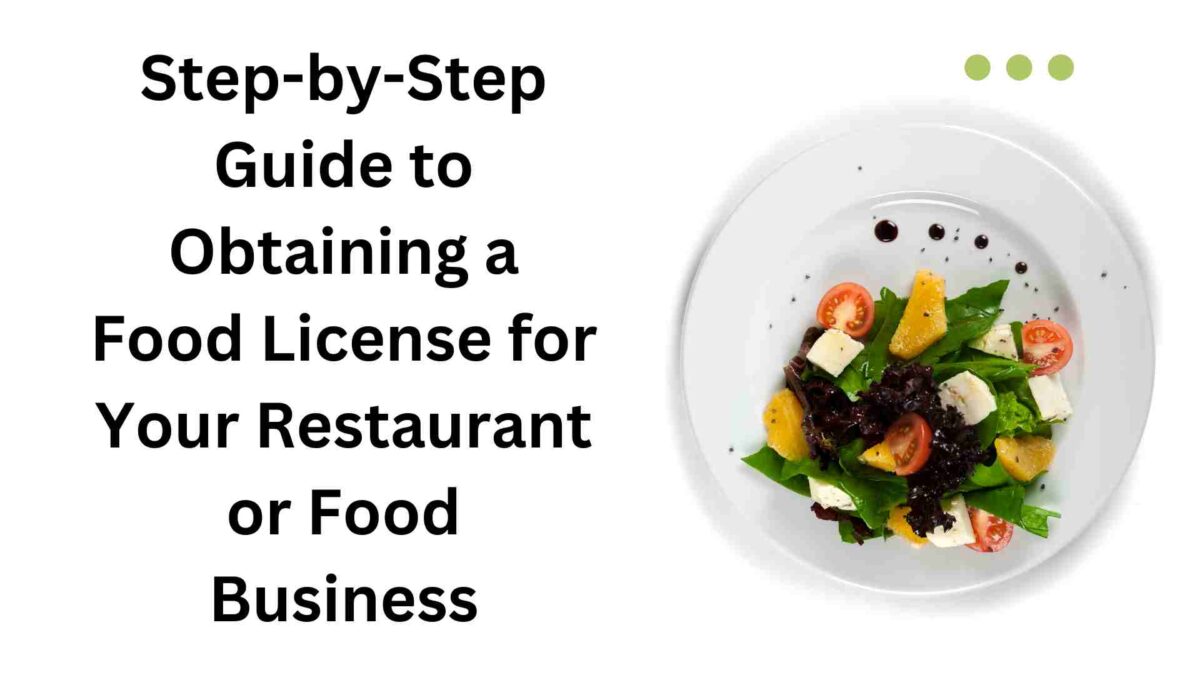Step-by-Step Guide to Obtaining a Food License for Your Restaurant or Food Business

FSSAI Registration refers to the process of obtaining a license or registration certificate from the Food Safety and Standards Authority of India. It is mandatory for all food businesses operating in India, including food manufacturers, processors, distributors, retailers, and food service providers, to obtain an FSSAI registration or license to ensure compliance with food safety regulations. A food license, also known as a food permit or food establishment license, is an official authorization or permit issued by local or governmental authorities that grants permission to individuals or businesses to engage in activities related to the production, handling, distribution, sale, or service of food products.
Step 1: Research and Identify Required Licenses:
When starting a food business, understanding the specific licenses needed is crucial. Different types of food businesses require distinct permits based on their activities. For instance, a food truck may require different permits compared to a sit-down restaurant. Research local regulations and consult with regulatory bodies or experts to identify the necessary licenses for your establishment.
Step 2: Understand Regulatory Requirements:
Compliance with regulatory requirements is fundamental. Health codes and regulations vary by region and are designed to ensure food safety and protect public health. Stay updated with these standards and familiarize yourself with the specific rules governing your food business, including temperature controls, sanitation practices, allergen management, and employee training.
Step 3: Prepare Necessary Documentation:
Accurate and complete documentation is vital for a smooth application process. This includes business registration documents, lease agreements, proof of ownership or permission for the premises, food safety plans, and certifications like ServSafe or food handler permits for staff members.
Step 4: Create a Comprehensive Food Safety Plan:
Developing a robust food safety plan is essential. Outline procedures for receiving, storing, preparing, and serving food while adhering to hygiene standards. This plan should detail food sourcing, storage temperatures, cleaning schedules, and protocols for handling potential allergens or foodborne illnesses.
Step 5: Submit Application and Fees:
Carefully complete the application forms and submit them along with the required documentation and fees to the appropriate regulatory authority. Pay close attention to deadlines and specific instructions to avoid delays in processing your application.
Step 6: Schedule Inspections and Compliance Checks:
Prepare your establishment for inspections once the application is submitted. Inspectors will evaluate various aspects, such as cleanliness, food storage, equipment maintenance, and adherence to health and safety guidelines. Address any identified issues promptly to ensure compliance.
Step 7: Obtain Approval and License Issuance:
Upon successful completion of inspections and compliance checks, you’ll receive approval for your food license. This license signifies that your business meets the necessary standards to operate legally. Display the license prominently within your establishment as it instills confidence in customers and demonstrates your commitment to food safety.
Step 8: Renewal and Compliance Maintenance:
After obtaining your food license, it’s essential to stay updated with renewal deadlines. Food licenses typically have expiration dates and require periodic renewal to ensure continued compliance. Keep track of renewal dates and submit necessary documentation and fees promptly to avoid any disruptions to your business operations.
Step 9: Employee Training and Continued Education:
Invest in ongoing employee training programs focused on food safety, hygiene practices, and compliance with regulations. Ensure that all staff members handling food are aware of and trained in proper food handling techniques, sanitation protocols, and health and safety standards. Encouraging a culture of continuous learning and improvement is key to maintaining compliance.
Step 10: Stay Informed About Regulatory Changes:
Regulations governing the food industry can evolve. Stay informed about any updates, amendments, or new regulations introduced by local health departments or government agencies. Regularly review and adjust your practices to align with the latest standards to maintain compliance.
Step 11: Responding to Inspections and Adhering to Corrective Actions:
In the event of inspections or compliance audits, cooperate fully with inspectors and address any identified issues promptly. Implement corrective actions swiftly to rectify deficiencies noted during inspections. Maintaining a proactive approach to addressing concerns ensures ongoing compliance and demonstrates a commitment to food safety.
Step 12: Consider Professional Guidance and Compliance Services:
Navigating the complexities of food licensing and regulations can be challenging. Consider seeking professional guidance from consultants, legal advisors, or compliance services specializing in the food industry. They can offer expertise, guidance, and support to ensure adherence to regulations and streamline the compliance process.
Note: You can also Apply for Renewal of Fssai license
Step 13: Community Engagement and Building Trust:
Engage with the local community and build trust by demonstrating your commitment to food safety and quality. Communicate transparently about your adherence to regulations, sourcing of ingredients, and hygiene practices. Participate in community events or initiatives to showcase your dedication to operating responsibly.
Conclusion:
Obtaining and maintaining a food license for your restaurant or food business is an ongoing commitment to compliance, safety, and quality. By following these steps and maintaining a proactive approach towards regulatory compliance, you not only ensure the legality of your operations but also prioritize the health and satisfaction of your customers. Remember, staying informed, proactive, and dedicated to upholding food safety standards is fundamental to the success and longevity of your food business.









